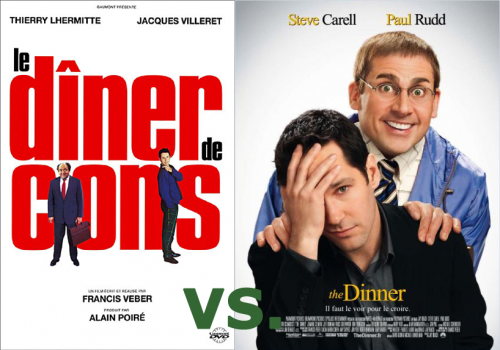French Influence in Hollywood
Unlike the rest of the world, Americans are accustomed to viewing their films without voice-overs, without subtitles, and with actors they recognize. Imagine going to the movie theater every time just to see actors who you know do not think the same way, do not speak the same language, and whose actual voices you know […]
Unlike the rest of the world, Americans are accustomed to viewing their films without voice-overs, without subtitles, and with actors they recognize. Imagine going to the movie theater every time just to see actors who you know do not think the same way, do not speak the same language, and whose actual voices you know you will never recognize due to the process of dubbing. That would take out some of the fun, intimacy, and feeling of comradeship that Americans have. The rest of the globe has contented itself with awkward translations, ill-timed voice-overs, actors of foreign origin, and of course an overload of American culture from each film.
Americans are unaware of how many “American” films are not originally American. Hollywood likes a sure bet, and the best way to lower gambling risks is to produce a film from a book, foreign film, or even a foreign play that has already proven successful. To ensure that success, Hollywood doesn’t bother dubbing films, they simply remake them. New cast, different jokes, and of course lots of special effects. The goal of the remakes is to replace any traces of foreign culture that existed in the original films. This leaves Americans and the rest of the world under the impression that Hollywood alone is responsible for yet another blockbuster hit. The French have noticed the reaction to their “butchered” films, and they are not too happy about it.
Hollywood remakes movies from all over the world, as I am sure the horde of Asian-style horror movie remakes has not gone unnoticed. Through the eyes of American remakes, France has indirectly offered the world many successful films: Dinner for Schmucks, The Birdcage, The Next Three Days, The Tourist, Taxi, Three Men and a Baby, and True Lies, just to name a few. These movies usually only did well in France when the French versions were released, however once America gets a hold of them, suddenly the world takes notice.

The American versions differ greatly from their French counterparts. In order to adapt the story line to the American audience, jokes must be changed, political punch lines are often removed completely, and any French film lacking in morality is sure to have an overflow of it, good old-fashioned American-style. According to French audiences, American jokes tend to be more vulgar, less political, and more casual. In the French versions, jokes tend to be more serious, while the actors often gesticulate while making over-exaggerated facial expressions to accompany their joke. This type of humor is not popular in the U.S. and naturally wouldn’t be successful.
The idea of remaking a film that already exists seems redundant, but the underlying purpose is to make money for both the States and France. Both countries are aware of the resources, networks, and distribution channels Hollywood processes in order to make a film not just successful in one country, but all over the world. This can be contributed to several factors such as: bigger budgets, pre-established similarity with American culture throughout the world, recognized actors, and flashy special effects. When it comes to France, very little is known to foreigners concerning the real day to day life, politics, and humor that exists in French culture. Humans need familiarity, and a common understanding; For the moment, that is through Hollywood.
French actors, screenplay writers, directors, and producers would rather that their versions reach the world, but accept that reaching the world through another country is better than not reaching out at all. Through Hollywood’s remakes of French films, France hopes to attract the world’s attention, in hopes that one day remakes will not be necessary. French actors and directors also find that by collaborating with Hollywood, more doors are opened for their individual careers, since Hollywood produces the most blockbuster films in the world each year. Once they have the right amount of recognition, they will no doubt redirect that attention from Hollywood back to France.
Those involved in the world of French film accept Hollywood’s current domination, but French civilians are not as happy with Hollywood’s defiling of their national treasures. Many French boycott Hollywood remakes of French movies, while others go to view the films with the intention of mocking them. The French are rightfully upset with Hollywood’s “anything you can do, we can do better” attitude. The coming of another remake often generates anti-Americanization discussions throughout France. On the other hand, the rest of the world embraces the remakes with open arms, often never realizing the script’s origins.
In order to clarify some major differences between remakes and French originals, I will compare the original Le Diner de Cons, with the American remake, Dinner for Schmucks starring comedians Steve Carell and Paul Rudd. In the French version, the “schmuck” built famous monuments from matches, whereas the American “schmuck” recreated scenes of everyday life using dead mice. The common complaint from French viewers is that the American version had too much moral for their taste. In the original, the schmuck is not befriended as he is in the American remake. Sorry, I suppose we forgot how to be truly mean to those different from us, and less fortunate than we are.
Hollywood is remaking more and more foreign films every year, many of which are originally French films. The French do not like the difference in reactions to the remakes versus the originals, however, they welcome the international exposure. Viewing both versions of a film in any case is a great way to analyze cultural differences.
Jacqueline Perrier-Gillette is currently a resident of Paris, France, where she lives with her husband. Together the two of them operate their small translation company, giving Jacqueline the opportunity to observe the French and their culture up close. She is an avid reader, writer, and student of foreign languages.
By Jacqueline Perrier-Gillette





